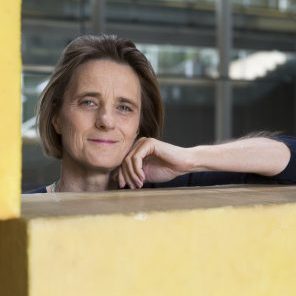Keynote Talks

Prof Mel Slater
Afiliation
Event Lab, University of Barcelona, ES
Institute of Neurosciences, University of Barcelona, ES
Talk
How the brain represents the body is a fundamental question in cognitive neuroscience. Experimental studies are difficult because ‘the body is always there’ (William James). In recent years immersive virtual reality techniques have been introduced that deliver apparent changes to the body extending earlier techniques such as the rubber hand illusion, or more completely substituting the body by a virtual one visually collocated with the real body, and seen from a normal first-person perspective. This talk will introduce these techniques, and also show that changing the body can change the mind – including physiological, behavioral, attitudinal, and cognitive changes.
Bio
Body Representation in Virtual Reality
Prof. Mel Slater
University of Barcelona, ES

Prof. Daphné Bavelier
Afiliation
Talk
Action video game players outperform their non-action-game playing peers on various sensory, attentional and cognitive tasks. A training regimen whose benefits are so broad is rather unprecedented and provides a unique opportunity to identify factors that underlie learning and principles of brain plasticity. Practical applications from education to rehabilitation will be discussed.
Bio
Daphne Bavelier is an internationally-recognized expert on how humans learn. In particular, she studies how the brain adapts to changes in experience, either by nature – for example, deafness – or by training – for example, playing video games. Her lab established that playing fast-paced, action-packed entertainment video games typically thought to be mind-numbing actually benefits several aspects of behavior. Exploiting this counter-intuitive finding, the Cognitive Neuroscience research team she now heads at the University of Geneva, Switzerland investigates how new media, such as video games, can be leveraged to foster learning and brain plasticity.
Bavelier is a co-founding scientific advisor of Akili Interactive, a company which develops clinically-validated cognitive therapeutics that exploit video games, and has contributed as an expert for the World Economic Forum in domains as varied as Education (New Vision for Education: Unlocking the potential of technology) or Human Enhancement (World Economic Forum Global Future Council on Human Enhancement).
Her scientific contribution has been recognized by several prizes over the years, including the John Merck Scholar Award (2000-2004), a finalist selection for the Blavatnik Awards for Young Scientist (2008), and more recently being the recipient of the 2019 Klaus J. Jacobs Awards, that honors outstanding research with social impact on children and youth with a one million Swiss Francs endowment.
Daphné Bavelier is a French cognitive neuroscientist who specialized in brain plasticity and learning. She is a full Professor at the University of Geneva in the Faculty of Psychology and Educational Sciences.
Your Brains on Action Video Game
Prof. Daphne Bavelier
University of Geneva, CH

Dr. Shamsi Iqbal
Afiliation
Talk
Description: As our work environments and work practices rapidly evolve as a result of the changing landscape of work, what we envision as the future of work is being fundamentally challenged. Research in the area of productivity and multitasking has to adapt to the changing world anticipating what the future may look like – in particular taking into account growing needs of balancing work and life. In this session, I will talk about redefining productivity for the new future of work, where many organizations are switching to hybrid. In hybrid scenarios, the need to do things while on the go or while in divided attention scenarios will continue to dominate and where taking care of wellbeing will rapidly become a core necessity for sustained productivity. I will discuss strategies of how thoughtful design of tools and products can promote wellbeing, even when the core functionality of the tool is not about wellbeing, and what organizations should be doing to adapt to a successful future of hybrid work.
Bio
Dr. Shamsi T. Iqbal is a Principal Researcher in the Productivity and Intelligence group (P+I) in Microsoft Research, Redmond. Her primary expertise is in the domain of Attention Management and Interruptions. More recently her work has focused on redefining productivity, introducing novel ways of being productive through leveraging micro-moments and balancing productivity and well-being in interaction design. Shamsi’s research related to the Future of Work has been covered in the Economist, the Atlantic, and the Technology Review Germany in recent times. Her work on driving and distraction was featured in the New York Times, MIT Tech Review among others, and also covered by the King 5 News (NBC affiliate in the Seattle area). Shamsi has served on many organizing and program committees for Human-Computer Interaction conferences, is currently serving as an ACM TOCHI Associate Editor, Guest Editor for IEEE Pervasive Special Issue on Future of Work and was the General Co-chair for UIST 2020. She is one of the co-authors of the document Microsoft released on the Future of Remote Work in 2021. Shamsi received her Ph.D. in Computer Science from the University of Illinois at Urbana-Champaign in 2008 and Bachelors in Computer Science and Engineering from Bangladesh University of Engineering and Technology in 2001.
The Future of Work
Dr. Shamsi Iqbal
Microsoft Research, US

Prof. Matthew Rizzo
Afiliation
Talk
This talk underscores bidirectional links between real-world driving behavior in health and disease, along with promising evidence-based measures and effective configurations of sensor technologies for recovering health-relevant data from human behavior and the “brain-in-the wild”. Our research teams use human factors/ergonomics, ethology, systems thinking, and novel tools to synchronize sensor signals and glean digital biomarkers from continuous decades of big, real-world data from a person’s own environment–at home, at work, at play, and in transit– to answer fundamental questions translatable to clinical research and practice. Our work, supported by the US NIH and industry, underscores the most promising evidence-based measures and effective configurations of sensor technologies for recovering health-relevant data in the real world. We have extended this data collection to automobile driving, in line with the NIH “All of Us” efforts to collect prospective data from up to a million people in the field. In our work, a person’s own car and ubiquitous personal sensors capture a wide variety of health data, paving the way for egalitarian access to healthcare diagnostics outside the traditional confines of a hospital, clinic or workplace. The results can then be confidentially shared with medical practitioners and researchers through the electronic medical record to address a range of medical disorders such as diabetes and arthritis, visual and mental disorders, aging, and neurodegenerative disorders such as Alzheimer’s and Parkinson’s diseases –that affect perception, attention, cognition, sleep, mobility, and mood, the fundamental quotidian determinants of human behavior. These efforts require innovative multidisciplinary team science, novel sensor-technologies, experimental designs, bioinformatics, analytic approaches to observational data, computer vision and machine learning tools, and close attention to personal privacy rules and ethics. This approach may also meet urgent societal needs, as expressed by the US NIH and FDA, to track post-acute sequelae of the SARS-CoV-2/ COVID-19 pandemic and to track the efficacy of drugs, biological agents and devices in the real world. Ongoing developments underscore the promise of public and private investment in neuroscience research – and the need for federal regulators to be prepared to address unique technologies and diagnostic modalities as they continue to emerge.
Bio
Digital Biomarkers
Prof. Matthew Rizzo
University of Nebraska, US
